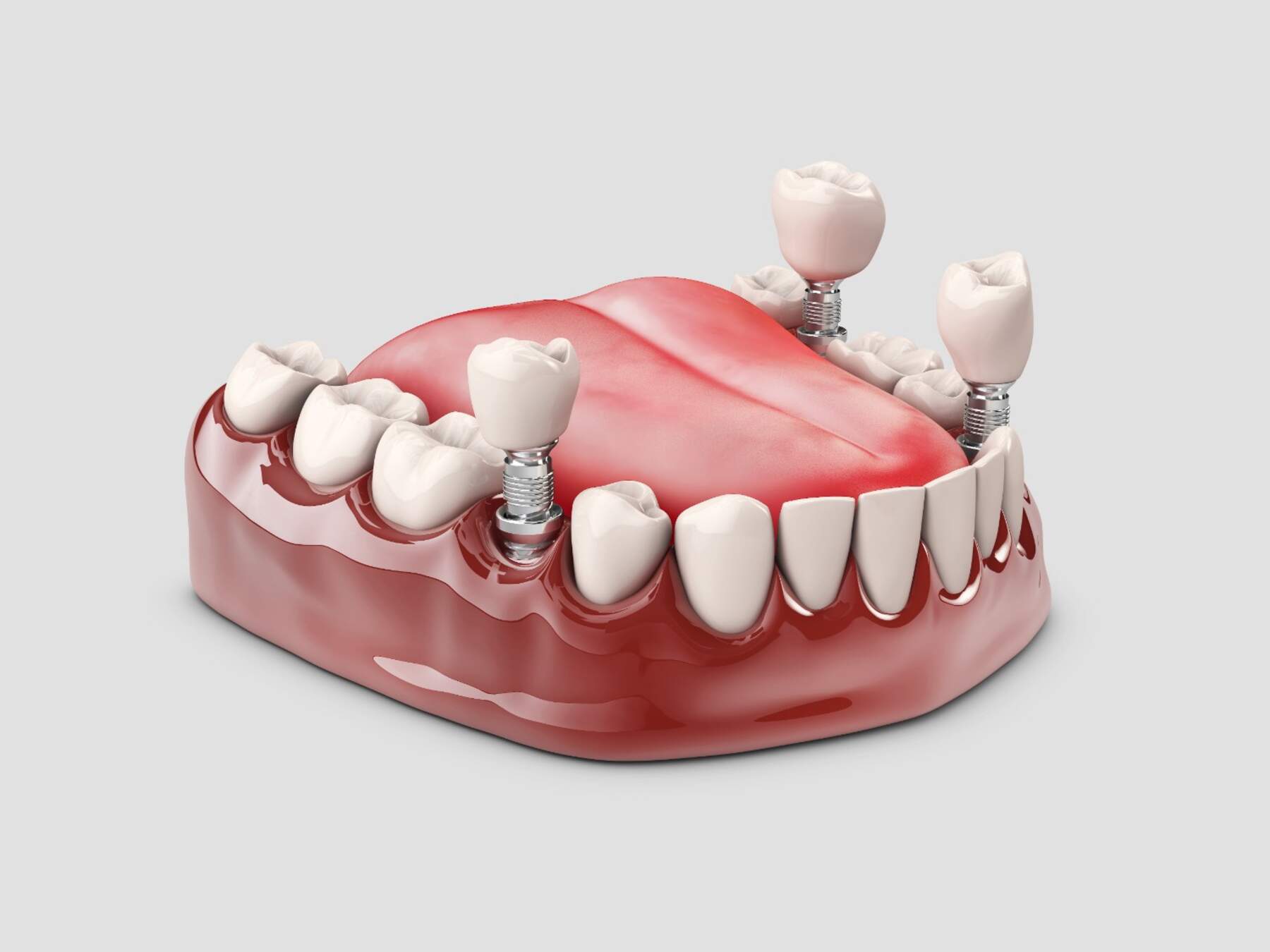Dental implants are among the most common tooth replacement alternatives since they eliminate the need for additional pain. Dental implants are well-known for their longevity in addition to their capability to mimic the appearance and feel of natural teeth. These titanium pillars mix perfectly with the bone and are used to replace lost teeth.
Painless dental implants are the best option for persons who have been in a mishap or who have had their tooth extracted due to deterioration. Dental implants help to preserve the alignment of your neighboring teeth while also preserving your natural face shapes.
What is the purpose of painless dental implants?
A surgical procedure is used to place dental implants in the jawbone. Dental implants do not produce any sound, slide, or cause bone injury like dentures or a permanent bridgework. This is caused by the metal root fusing with the bone. In contrast to the real teeth, the materials used in dental implants do not deteriorate. As a rule of thumb, dental implants may be a good option to consider if you:
- Have a jawbone that has grown completely
- Maybe have one or more teeth missing
- Have strong oral tissues
- Have enough bone to sustain the dental implants or are capable of receiving a bone graft
- Are unable or reluctant to wear dentures
- Are trying to improve your talking
Why You Should Not Be Worried About The Dental Implants Procedure?
Dental implants have various advantages, yet they can cause anxiety in certain people. Whenever anyone hears the word “operation,” he or she immediately associates it with agony and, as a consequence, with anxiety. To be honest, dental implant surgery is a regular procedure that will not bring you any unnecessary pain or delays. If you are worried about undergoing dental implant surgery, dental experts can promise you that it will be a painless and relaxing experience. We will give you some grounds to believe that the dental implant surgery is not as frightening and unpleasant as you believe.
Surgery Process: A Precise Process
A dental implant treatment necessitates cautious and accurate planning ahead of time. The dentist ought to be in charge of the medical and dental history, as well as every aspect of the scheduled visit. If you are one of the challenging instances, the dentist will need an X-ray or CT imaging to figure out the precise and proper implant placement. The images will also aid in the development of a management plan that must be performed during the dental implant operation.
The thorough guidelines allow for exact and precise cuts to build the groove that will retain the replacement teeth. You should opt for a competent dentist who has experience executing dental implant surgery to alleviate your concerns. The dentist and surgeon’s past knowledge will help them complete the dental operation smoothly while also knowing how to react accordingly if something unforeseen occurs during the surgery process.
There Will Be No Pain
You should not be concerned about discomfort when undergoing dental implant surgery. Throughout the process, you will be given local anesthetic to dull the tissues wherein the dentist will be working. Well before the action plan begins, you will be administered numbing medicine to guarantee your safety. To ensure that the region is completely numbed, the oral surgeon and dentist must first test it and question you if you sense anything. Also, if you believe you are having anxiety symptoms or are afraid of the surgery procedure, you can demand an anti-anxiety medication or a supplemental sedative prior to the procedure. You will be relieved to learn that the dental implant procedure is done in only one day, allowing you to recover your normal routine in a timely manner.
Dental Implant Post Operative Discomfort Is Minimal
You will feel minor agony following the surgery as a result of the pre-planned surgical plan, along with the new implantation methods and tools. The very worst type of unpleasantness may be a small dissatisfaction when the treatment is over, but even this is uncommon. In reality, the vast majority of patients report no pain at all. If you are truly in pain, the dentist may recommend that you use an over-the-counter medicine to alleviate the suffering. You may also be given a prescription for pain relievers.
Experience Lifelong Longevity
When contrasted with traditional implants, the dental implant treatment that is currently being performed has a greater rate of success. The success rate ranges from 96 to 98 percent, and the percentages haven’t been reduced in a long time. Dental implants are additionally more resilient than dentures and need less maintenance. The duration of the implants typically ranges from 25 to 30 years, and if they are handled correctly and cared for, their longevity can be prolonged.
Dental Implant Surgery Preparation
The pre-surgical period is both straightforward and easy. You will receive a full dental examination from the oral surgeon and dentist, as well as dental X-rays and models of the mouth and teeth. You can now express your problems with the dentist in a bid to help him in addressing them. Include any health issues and medicines you are currently taking, particularly supplements, over-the-counter, and prescription treatments. The planning phase may involve a variety of dentists and experts who will ensure that you are supplied with the best dental program that is tailored to your specific circumstances and demands.
What Can You Expect on Surgery Day?
You will be prepped and administered a local anesthesia when you reach the dental facility for the surgery. Following that, the dental specialist will present the surgical strategy and continuously prep your mouth. You may feel some sensations while the dentist drills tiny holes into your jaw and after slicing the gums to reveal the bone. The holes must be fitted tightly to ensure that there isn’t any gap for the post to slide or wriggle. The titanium post will be put on the inside surface as quickly as the hole attains the optimal size. Prior to actually stitching the gums back together, the dentist may need another X-ray to ensure that all of the posts are properly positioned.
Following Aftercare Instructions
The dentist will talk about your treatment and you will receive a printout of some aftercare recommendations that you need to follow following the treatment. Make certain that you do not neglect or disregard the guidelines because proper maintenance determines the rewards of the new dental implants. It requires approximately six months for the mouth to completely heal.
The Advantages of Painless Dental Implants
The clear advantage for the patient is receiving his dental implants sans discomfort, that represents one of the key considerations of individuals who must undergo implantology procedures. Yet, the employment of software and simulation has a number of additional advantages for the patient.
- Interventions that are more exact, precise, and less intrusive.
- More rapid intervention.
- Intervention times are reduced.
- Rehabilitation time is reduced.
- Error elimination.
- Surgical risk mitigation.
- Pain relief after surgery.
- There are no sutures, stitches, or swelling.
Why Do You Need Dental Implants?
- Aesthetics: Dental implants are the closest thing to healthy, real teeth. The implant restores the root of the lost tooth and looks, feels, and functions similarly to real teeth. They assist you retain the form and grin of your original face by preserving the jaw bone.
- Confidence: The implants are incredibly stable since they are bonded to your jaw. So they won’t fall out while you chat, eat, or laugh. Your speech will also sound more natural.
- Convenience: You clean and floss them just like your actual teeth. They are not like dentures, which must be removed from the mouth on a regular basis to be cleaned.
- Cost-effectiveness: Because of their lower upfront expenses, dentures or bridges may seem to be significantly less expensive than dental implants at the first sight. They might, nonetheless, necessitate being updated every 5 to 10 years, necessitating a larger commitment of labor and money. You might be shocked at how affordable dental implants are, especially when long-term success and value are considered.
- Long-term success: As a tooth replacement alternative, dental implants have the highest recorded success rates. Clinical research conducted over the last 40 to 50 years have revealed that dental implant surgery has a rate of success far above 95%.
- Dental implants are the sole tooth replacement method that promotes jaw bone and avoids bone loss. Also, differently from bridges or partial dentures, dental implants do not necessitate the crushing of neighboring teeth.
What Other Benefits Can Dental Implants Provide?
You can do the following with the assistance of dental implants:
- Replace one or more lost teeth avoiding causing damage to neighboring healthy teeth (as with classic bridges).
- To create a fixed prosthesis (bridge) when the classic prosthesis can only really create a moveable (removable) denture.
- If all of the teeth in the mouth are gone, we can increase the preservation of complete dentures by putting 2-4 implants in each jaw.
- The implants are restored to the best of their ability in terms of masticatory function, speech, and aesthetics, while minimizing the sensation of a foreign body. Using implants, one receives the impression of regaining one’s natural teeth.
What Should I Eat Or Do After The Surgical Procedure?
You will be given a postoperative treatment regimen with full instructions. In general, you must drink more liquids and consume soft, mashed foods following implant surgery. It is best to eat foods which do not demand severe chewing for as long as the process of healing will last. For the first 4 to 6 months, careful chewing is advised. It is not advisable to smoke.
What Does The Maintenance Of Dental Implants Include?
Dental implants, like real teeth, require annual maintenance and examination to ensure their longevity. You must maintain the implants just like you would your real teeth, but you ought to also pay particular attention to where the implants are placed.
Brushing twice a day, flossing, and regular dental visits all assist to keep them healthy. The picture all around the implant perspective is critical for controlling the integrity of bone and gum health in the implant area. Careful home care and frequent expert checkups are critical for their well-being.
Do I Need To Get A Dental Implant For Every Tooth I’ve Lost?
No, you do not. In reality, it is possible to substitute all of the lower teeth with a permanent bridge supported by 5-6 implants, whereas an equivalent comprehensive restoration in the upper jaw often requires 6-7 implants.




